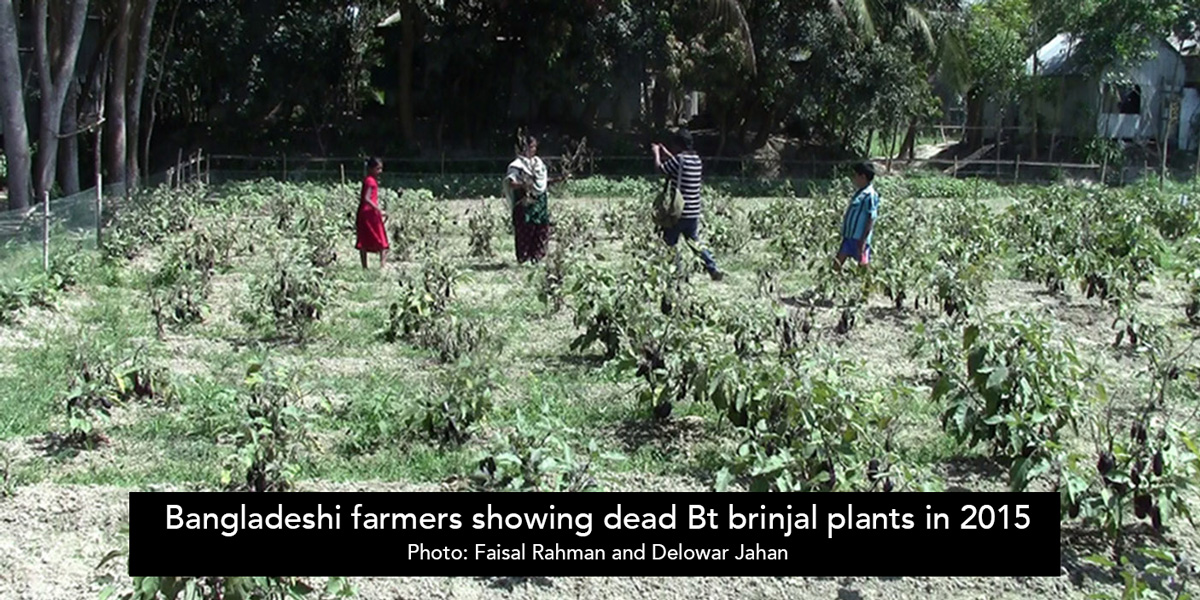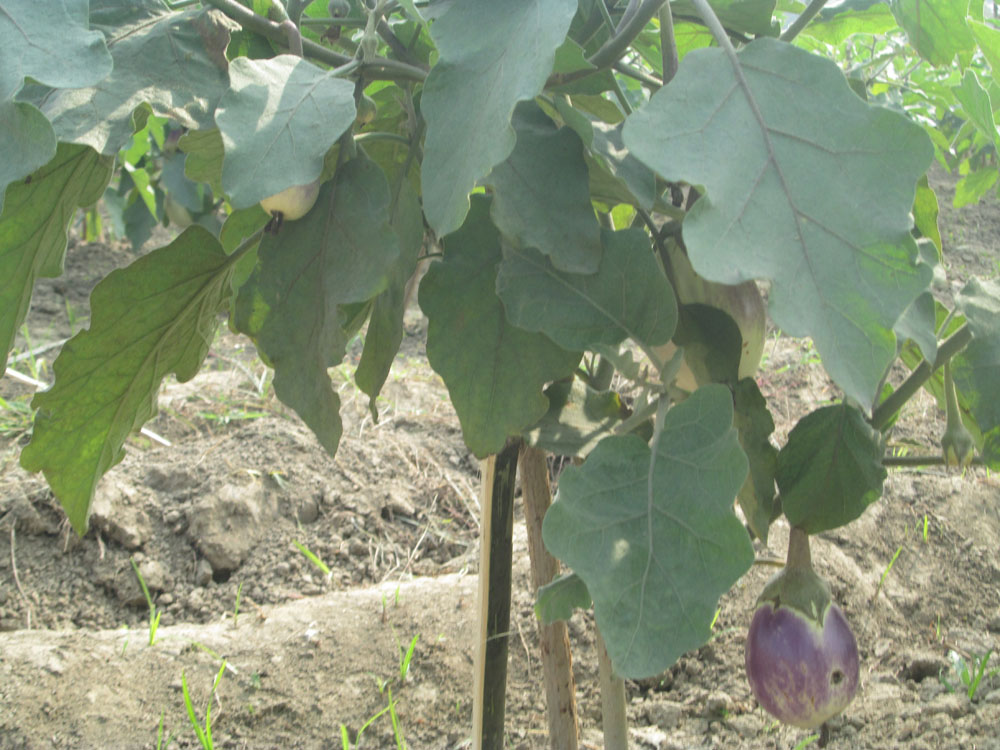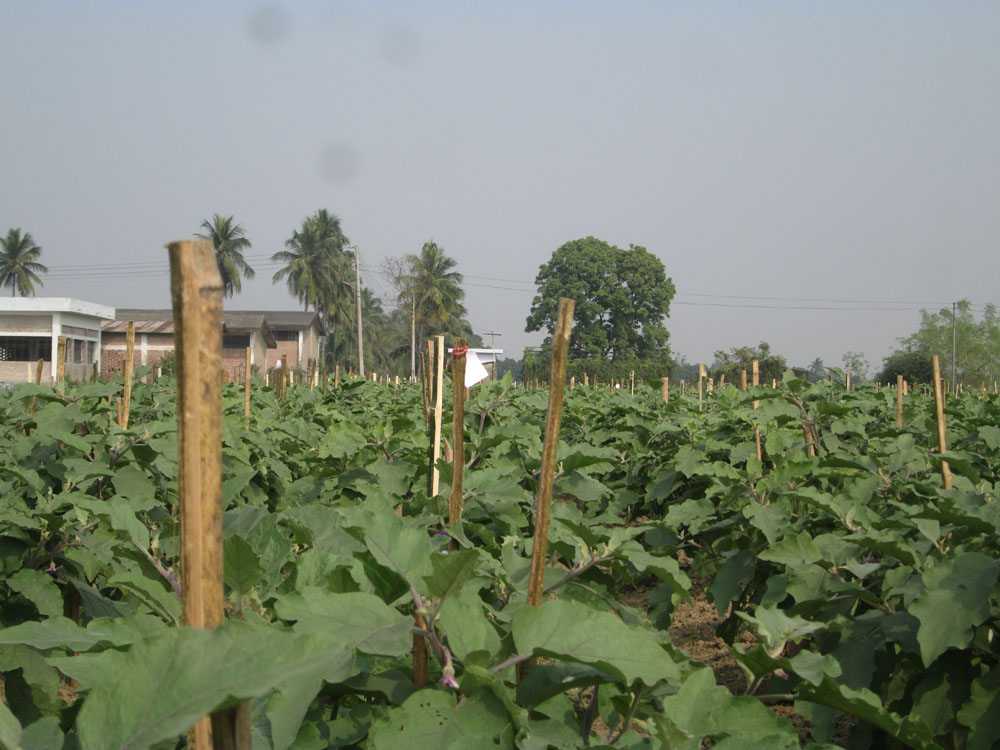
New farmers have been recruited to keep Cornell University’s failed Bt brinjal project on the rails as farmers who previously grew the crop are not interested in repeating the experience, reports Farida Akhter, director of the policy research organization UBINIG
In spite of the failure of Bt brinjal (eggplant) in its first two years of cultivation in Bangladesh, a third round of cultivation is under way. Very few of the farmers who previously cultivated the crop are interested in doing so again, so new farmers have had to be recruited.
No report has been published on the research findings of the first two rounds of field cultivation of Bt brinjal, apart from some propaganda news articles. The website of the Bangladesh Agricultural Research Institute (BARI), which is responsible for managing the project in Bangladesh, is silent on the subject. The originator of the Bt brinjal venture, Cornell University’s Agricultural Biotechnology Support Project II (ABSPII), also avoids reporting the facts on the ground, confining itself to generalized statements about the project’s background and partners.
Even the GMO industry group, the International Service for the Acquisition for Agri-Biotech Applications (ISAAA), has not published any report since its “Brief 47: The status of commercialized Bt Brinjal in Bangladesh”, in 2014.
In the second round of cultivation, Bt brinjal seedlings were given to 108 farmers, 79 of whom were interviewed by UBINIG staff and found to have experienced massive crop failures. This is in spite of claims made by the BBC programme Panorama that the crop had been a 90% success.
Life support
Bt brinjal is on life support. It will die as soon as the machine is unplugged. Yet in the third year of field cultivation, BARI expanded the project to 200 farmers, adding two extra Bt brinjal varieties.

Interestingly, very few farmers from the second round were included. If Bt brinjal had really been successful, there would have been a demand from the farmers, as well as from BARI and the Department of Agricultural Extension (DAE), to continue with the same farmers who had gained knowledge and experience and who had helped to establish the supposed ‘success’ of the crop.
In January 2016, UBINIG contacted 40 farmers in 9 districts and found that 37 farmers had not been contacted by the DAE or BARI, nor were they themselves interested in growing Bt brinjal. The reason was the failure of the previous field cultivation. Three farmers in three districts cultivated Bt brinjal again on smaller size plots at the request of the authorities. However, the entire management of the cultivation was done by officials, not the farmers.
In Pabna, a showcase farmer called Peyara Amzad was the only one who received Bt brinjal in all three rounds. In the third round he was given two Bt brinjal varieties, Bt brinjal 2 and Bt brinjal 4. He used 66 decimal of land under the close supervision of Agricultural Extension officers in Ishwardi. The fruits are yet to come. In Joypurhat, Hamidul was given Bt brinjal 6 and Bt brinjal 4, which he cultivated on 20 decimal of land. In Dinajpur farmer Anwar Hossain has cultivated Bt brinjal, but does not know which one. He only knows it was given to him by the Agriculture office. He is still waiting for the fruits. In Kushtia, the Agricultural Department did not contact any of the five previous season farmers, but gave Bt brinjal to five new farmers under the direct supervision of the BARI officials.
Two farmers in Pabna reported that they had been told that they could keep the seeds. Accordingly they saved some seeds from the Bt brinjals in the second round. However, the seeds were eaten by rats, so they could not try it again in the third round. Most farmers from the second round cultivated local brinjals and are happy with the productivity.
Farmers of the second round in Rangpur were unhappy about the failure of the crop. However, farmer Shafiqul Islam waited for the DAE to contact him; he said that if they paid his expenses, he would try again. But the DAE did not contact him. Farmer Matiar Rahman said that if they had any self-respect they would not promote Bt brinjal again.
In contrast, farmer Sakhawat Hossain cultivated a local variety of brinjal called Shoila and is expecting to harvest 5.5 tons from 33 decimal of land. In Bogra, farmer Abdul Matin incurred a loss last season, so this season he cultivated a high-yield non-GM variety. He has already harvested 74 kilos of brinjals from the field. More are expected.
In Gaibandha district, farmer Ibne Saud was asked by the DAE to cultivate Bt brinjal, but he refused. Instead he cultivated Chaitali brinjal and chilis on his 33 decimal of land.
In Gaibandha, another farmer, Sakhawat, did not cultivate Bt brinjal because he could not sell them in the market. The brinjal fruits became hard at one point and did not look edible. A similar objection was raised by three farmers in Rajshahi. They said that this brinjal does not have any market. It cannot be sent outside the area because the quality gets worse over time.
Farmer Sumon Ahmed in Rajshahi reported that he was given 100 kilos of late blight-resistant GM potato seeds by the authorities. So he did not cultivate Bt brinjal in the third round.

Now GM potato introduced
While the failures of Bt brinjal continue, the authorities are introducing GM crops one after the other. The latest addition to the list is a GM potato, claimed to resist late blight. BARI introduced this GM crop in the current season as a 'regulatory trial' – the last requirement prior to seeking approval for commercialisation.
Breeders involved in developing the GM potato since 2006 at BARI said the blight-resistant gene was taken from wild potato varieties and was engineered into a potato variety called Katahdin in the United States. They said it was crossed with Diamant and Cardinal – two popular potato varieties in Bangladesh. This is the second GM vegetable crop after Bt brinjal.
Brinjal and potato are important vegetable crops for the people of Bangladesh and are consumed on a large scale. Yet the Bt brinjal project has set a miserable precedent. Despite crop failures, a dearth of scientific validation, and a lack of acceptability at farmer level, Cornell’s ABSPII project and its partner BARI continue to play games with the lives and livelihoods of the people of this country.
If they are so sure that Bt brinjal is a safe and beneficial crop and that it saves the crops from pests (if not from pesticides), then they must at least label the GM brinjals, in line with Bangladesh’s biosafety requirements.









